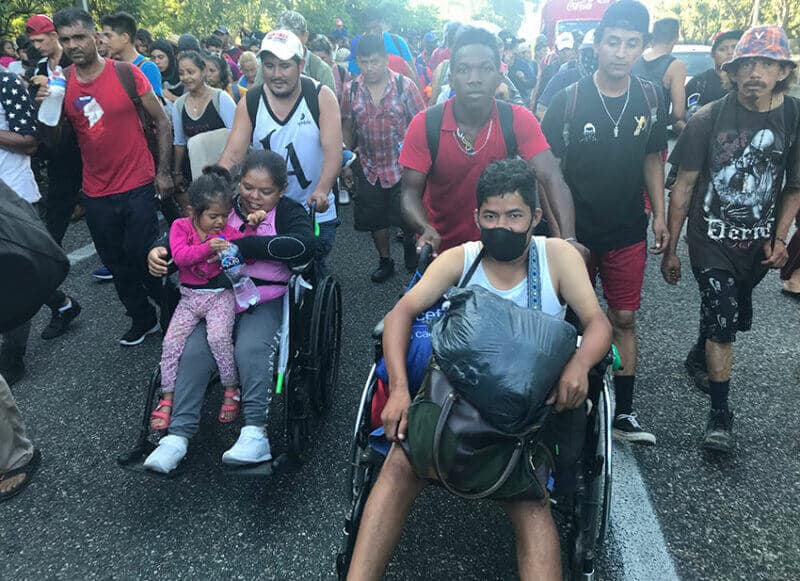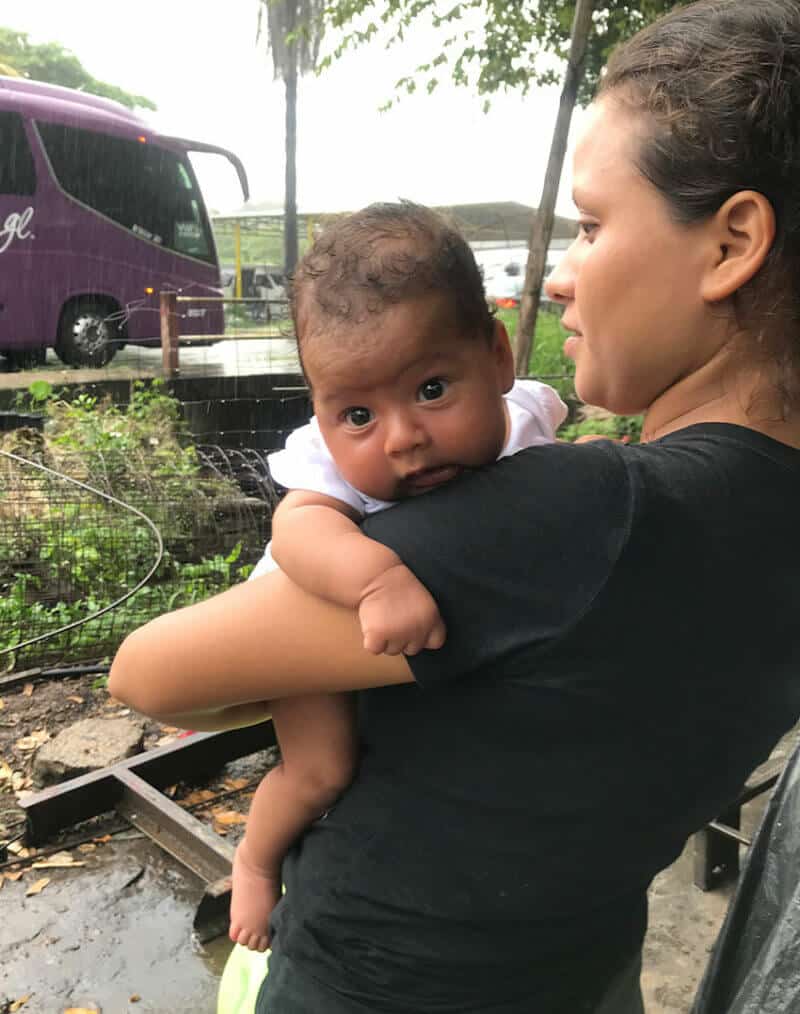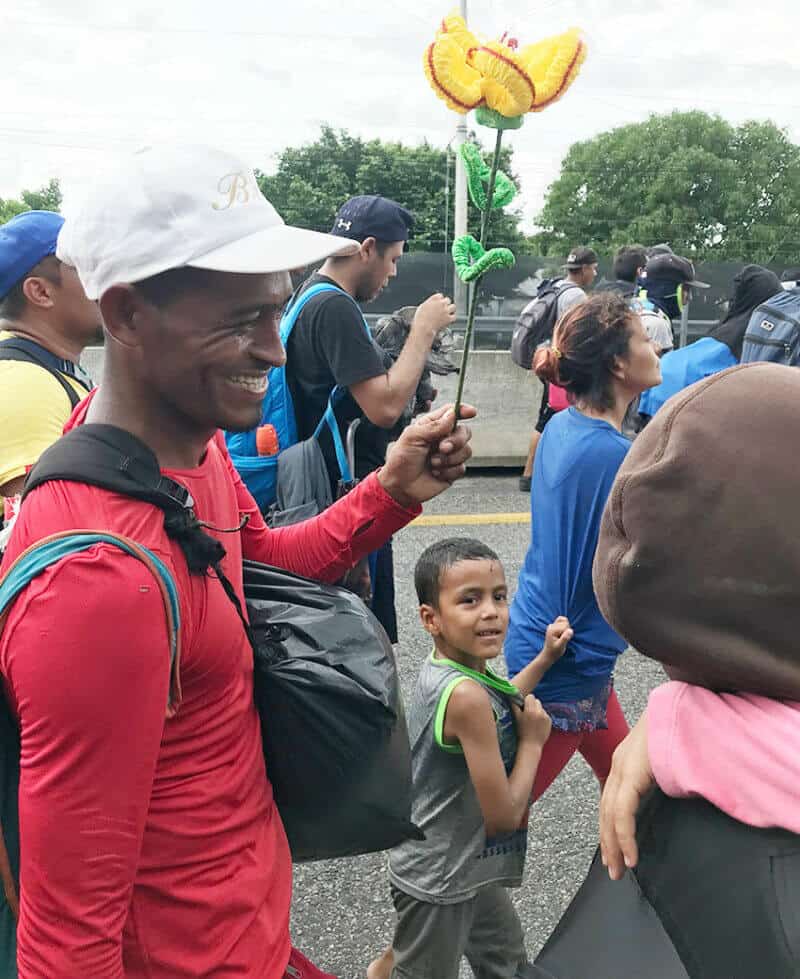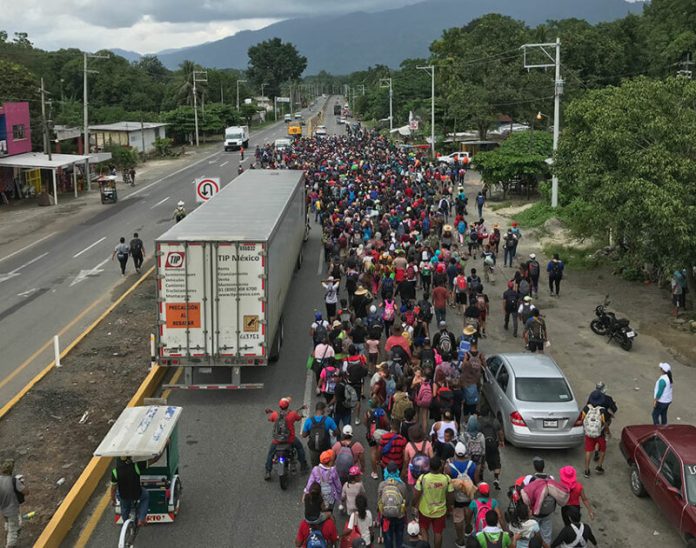The 2,000-strong migrant caravan which left Tapachula, Chiapas, on Saturday arrived at its first major milestone on Monday, just over 40 kilometers north.
After entering the town of Huixtla in heavy rain the majority of the travelers stayed in cramped conditions in a public sports field, but the town’s many cheap hotels were also filled. A Catholic church gave shelter to women traveling with children, but turned the fathers away.
The root cause of the caravan cannot be explained by poverty alone: many of the migrants can afford cheap hotels and buy food in local restaurants. It is not clear, however, how many of the convoy are traveling with no money at all.
Fears of a heavy-handed response by authorities are a constant. Tensions were high on Sunday night, spent in Huehuetán, due to worries of an ambush by authorities while the migrants rested. That failed to materialize, as did organizers’ concerns about a blockade on the way to Huixtla, where caravans have been detained in the past.
Their concerns are reasonable: National Guard and National Immigration Institute (INM) vehicles tail the convoy and wait in its path, but have so far regularly dispersed and regrouped farther along the highway. An official from the United Nations International Organization for Migration (IOM), who has previously accompanied larger caravans, said security officials’ approach had been unorthodox on this occasion.

The group left Huehuetán at around 6:00 a.m. Monday shortly before daybreak and the 18 kilometers to Huixtla would be the farthest that the caravan had walked in a day. Among the crowd are many pregnant women, young children, seniors and two people in wheelchairs.
Organizer Luis García Villagrán led a prayer at the town’s exit and many raised their hands to the air as a sign of religious reverence. Cries of “Freedom!” accompanied their departure from Huehuetán.
On the first two days, women and children remained at the rear of the caravan due to concerns for their safety in the event of confrontation with security officials. However, that created problems for the convoy’s cohesion, when those slower walkers lagged farther behind while stronger walkers at the front of the caravan accelerated away. On Monday, organizers changed their tactics, and women and children were encouraged to lead the caravan and dictate the pace, which also made them more visible and available to the media.
One mother, who was presented to national television news channels, said her group was looking after nine children.
Guzmán, a Nicaraguan migrant in his 20s, said he left his country due to the dictatorship of President Daniel Ortega. “We have a president that’s worse than Hitler … You can see in the news, you can see how many [political] murders there have been,” he said.
A woman collapsed exhausted after about two hours of walking in the hot conditions. She received medical attention from representatives of the French NGO Doctors of the World, despite migrants’ pleas for help from officials in a Health Ministry ambulance.

The caravan reached Segundo Cantón in the municipality of Tuzantan at about 11:30 a.m., still about five kilometers from Huixtla. The migrants dispersed into local hamlets to search for food and found a local tortillería and convenience stores.
The Hernández Marroquín family, among others, opened their doors to the migrants, offering water, a bathroom and places to sit, and helped them charge their phones and prepared eggs and beans bought by the migrants in convenience stores.
They refused to accept a single peso for their assistance. “You’re happy to be able to help others considering the situation they’re in,” family member Lorena Bravo said.
At around 2:00 p.m. the migrants advanced toward Huixtla, arriving during a rainstorm at about 4:00 p.m.
On Tuesday the group planned to rest before aiming to reach Escuintla on Wednesday, almost 32 kilometers north, the broadcaster TV Azteca reported.
Meanwhile, Foreign Minister Marcelo Ebrard said on Monday that the migrants were being lied to. “We will act with prudence, with care for the law and human rights, but we want to say that they are being deceived because it is not true that they are going to let them pass into the United States,” he said.

“What is the tragedy? The deception. They are told ‘We’ll go as a caravan, we’ll get to the United States and they are going to let us pass,'” he added.
Chief organizer Irineo Mújica has previously said the caravan is destined for Mexico City, where the INM will be pressured to regularize the migrant’s legal status. The organizers are not charging money to any of the migrants to travel with the caravan.
Many of the contingent felt they had no choice but to break the law by leaving Tapachula because of what they saw as negligence by the government refugee organization Comar and the INM.
The migrants who arrive at the United States border cross illegally in many cases, knowing that they would be refused entry on the basis of their nationalities. That is necessary even for those with asylum claims, which are generally accepted from Cuban, Nicaraguan and Venezuelan nationals due to the U.S. opposition to governments in those countries. But the logic is questionable: Honduras can be far more dangerous than those countries due to gang rule and the extortion of small business owners.
However, even migrants that have entered the U.S. hoping to make asylum applications have generally been prevented from doing so in recent years. So-called Title 42 authority first invoked by former president Donald Trump, and continued by President Biden, has been used to expel migrants from the country using the COVID-19 pandemic as a pretext. Yet Title 42 enforcement has seen migrants detained in cramped conditions in places that are ideal for contagion.
Mexico News Daily
